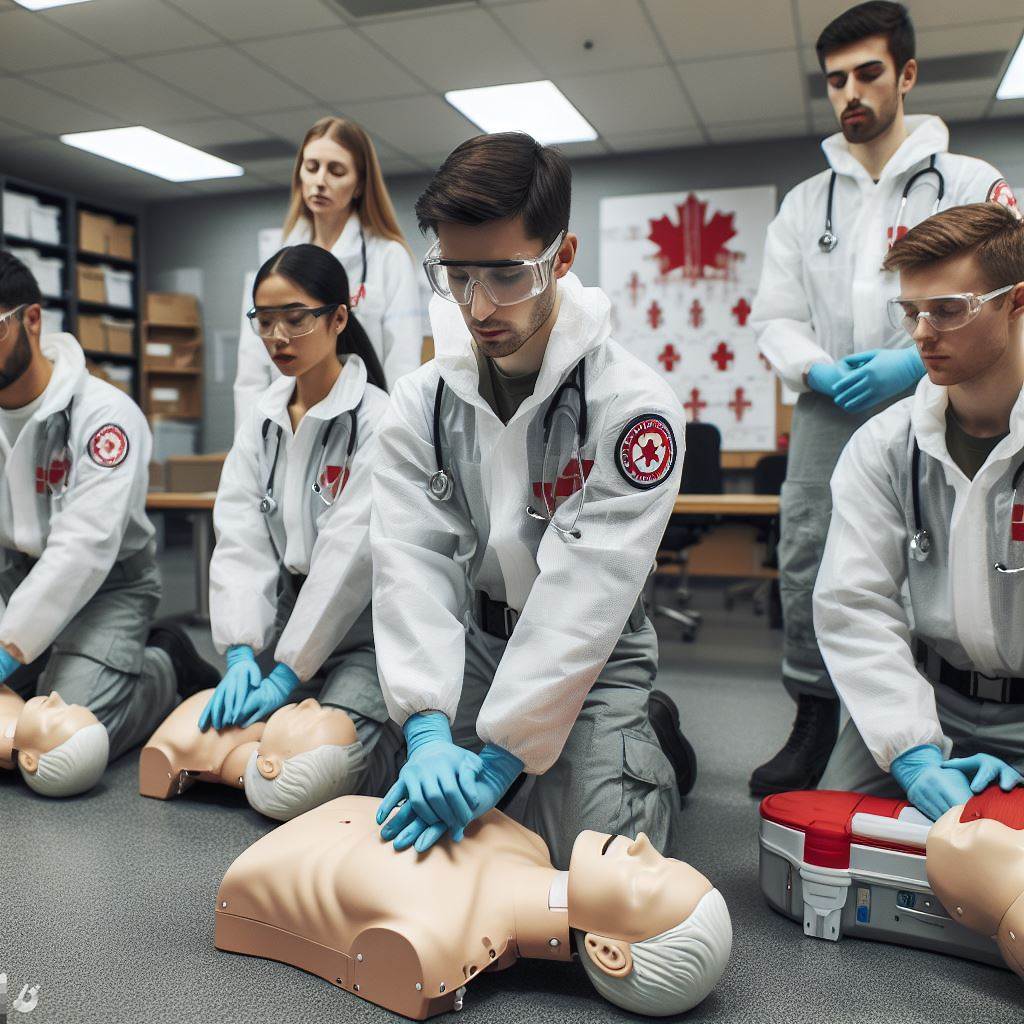Introduction
Ensuring optimal patient care, ongoing education for pharmacists is vital.
Staying updated with the latest advancements in the field is crucial. The ever-evolving landscape of pharmaceuticals demands continuous learning.
Pharmacist roles extend beyond dispensing medications. Their expertise impacts patient outcomes significantly.
To adapt to emerging therapies, they require continual education. Advanced knowledge enhances their ability to counsel patients.
The thesis stands: ongoing education is fundamental. It bolsters pharmacists’ capabilities and expertise.
This blog explores the significance of ongoing education. It delves into its impact on patient care.
Let’s navigate the landscape of continual learning.
Importance of Ongoing Education for Pharmacists
Ensures proficiency and competency in the profession
Continual education for pharmacists plays a vital role in ensuring the delivery of high-quality healthcare services.
By actively engaging in ongoing education, pharmacists can stay current with the latest developments in the industry and maintain their proficiency and competency in the profession.
Keeps pharmacists up-to-date with new medications, treatments, and technologies
One of the primary benefits of ongoing education is that it keeps pharmacists up-to-date with new medications, treatments, and technologies.
The field of pharmacy is constantly evolving, with new drugs being introduced, innovative treatment approaches being discovered, and advanced technologies being implemented.
Pharmacists need to stay informed about these advancements in order to provide the most appropriate and effective care to their patients.
Enhances knowledge and skills to provide better patient care
Through ongoing education, pharmacists have the opportunity to enhance their knowledge and skills, ultimately leading to better patient care.
By expanding their expertise, pharmacists can offer more comprehensive and personalized healthcare services.
They can provide valuable insights and recommendations to patients, ensuring optimal medication management and adherence.
Improves communication and collaboration within the healthcare team
In addition to improving patient care, ongoing education also plays a crucial role in improving communication and collaboration within the healthcare team.
As healthcare becomes more interprofessional, effective teamwork and collaboration are essential.
Pharmacists need to be able to communicate effectively with other healthcare professionals, such as physicians and nurses, in order to provide coordinated and integrated patient care.
Ongoing education helps pharmacists develop the necessary skills and knowledge to effectively collaborate within the healthcare team.
In fact, ongoing education for pharmacists is of utmost importance in maintaining proficiency and competency in the profession.
It ensures that pharmacists stay updated with new medications, treatments, and technologies, enabling them to provide the best possible care to their patients.
Moreover, ongoing education enhances knowledge and skills, leading to improved patient care and outcomes.
Finally, it fosters effective communication and collaboration within the healthcare team, promoting teamwork and better coordination of care.
Pharmacists should actively engage in ongoing education to continuously enhance their practice and contribute to the advancement of pharmacy as a whole.
Read: Balancing Work and Life as a Canadian Doctor
Continuing Education Options for Pharmacists
Continuing education plays a vital role in the pharmacy profession.
Pharmacists must continuously update their knowledge and skills to provide the best possible patient care and stay current with the ever-evolving healthcare landscape.
Fortunately, there are various continuing education options available for pharmacists.
Continuing Professional Development (CPD) programs
One of the most common options is Continuing Professional Development (CPD) programs.
These programs aim to provide pharmacists with ongoing education and development opportunities.
By participating in CPD programs, pharmacists can update their knowledge, enhance their skills, and stay up-to-date with the latest advancements in the field.
Accredited CPD programs are recommended, as they ensure the quality and credibility of the education received.
Conferences, Seminars, and Workshops
In addition to CPD programs, attending conferences, seminars, and workshops is highly valuable for pharmacists.
These industry-specific events offer a platform to network with colleagues, share knowledge, and learn from experts in the field.
Pharmacists can gain valuable insights into emerging trends, new medications, and innovative practices.
Some notable conferences, seminars, and workshops for pharmacists include the APhA Annual Meeting and the Global Conference on Pharmacy and Pharmaceutical Sciences.
Online Courses and Webinars
Another popular option for continuing education is online courses and webinars.
Online learning has gained popularity due to its flexibility and accessibility.
Pharmacists can benefit from the convenience of online courses, which allow them to learn at their own pace and schedule.
Reputable platforms offering online courses for pharmacists include Coursera, Khan Academy, and the American Society of Health-System Pharmacists.
These platforms provide a wide range of courses covering various topics relevant to pharmacy practice.
The benefits of continuing education for pharmacists are numerous.
By staying updated with the latest advancements and best practices, pharmacists can provide better patient care and improve medication management.
Continuing education also enhances critical thinking skills, problem-solving abilities, and professionalism.
It allows pharmacists to adapt to changes in healthcare policies, regulations, and technology, ensuring they remain competent and valuable members of the healthcare team.
In essence, ongoing education is essential for pharmacists to remain competent and up-to-date in their practice.
Continuing Professional Development (CPD) programs, conferences, seminars, workshops, and online courses provide valuable opportunities for pharmacists to enhance their knowledge, skills, and professional development.
Investing in continuing education ensures that pharmacists can provide optimal care to their patients and contribute to the advancement of the pharmacy profession.
Read: Pediatric Nursing in Canada: A Closer Look

You Might Also Like: The Future of Paramedicine in Canada
Continuing Education Requirements for Pharmacists
National and provincial regulatory bodies
1. Role of regulatory bodies in setting continuing education requirements
Pharmacists play a vital role in the healthcare industry, ensuring the safe and effective use of medications.
To maintain their expertise, pharmacists must engage in ongoing education throughout their careers.
Regulatory bodies at the national and provincial levels establish requirements to ensure pharmacists stay up to date with the latest developments in their field.
Overview of ongoing education requirements in Canada
To maintain their professional licensure, pharmacists in Canada must meet certain continuing education requirements.
These requirements typically consist of continuing education hours or credits, specific areas of focus, and reporting and documentation guidelines.
1. Continuing education hours or credits
Pharmacists are required to complete a certain number of continuing education hours or earn a specified amount of credits within a defined period.
These hours or credits reflect the time spent on educational activities aimed at enhancing their knowledge and skills.
The exact number of required hours may vary by province or territory, but typically ranges from a few dozen to over a hundred hours every license renewal cycle, which is usually two to three years.
2. Areas of focus or mandatory topics
In addition to accumulating a certain number of continuing education hours, pharmacists often need to focus on specific areas or mandatory topics.
These topics are designed to address emerging issues, new regulations, advancements in pharmaceutical sciences, or changes in practice standards.
Some common mandatory topics include medication safety, immunizations, chronic disease management, and pharmacy law and ethics.
3. Reporting and documentation guidelines
To ensure accountability and transparency, pharmacists are required to report their completed continuing education activities to the regulatory bodies.
They must maintain proper documentation to verify their participation, such as certificates of completion or transcripts.
Regulatory bodies may also conduct audits to ensure compliance with the continuing education requirements.
Overall, continuing education requirements for pharmacists in Canada aim to promote lifelong learning, professional development, and the provision of high-quality healthcare services.
By staying current with the latest knowledge and skills, pharmacists can better serve their patients and contribute to the overall improvement of medication therapy management.
Remember, whether you’re a pharmacist or a patient, ongoing education is crucial in the ever-evolving field of pharmacy.
It ensures that pharmacists remain competent, informed, and capable of providing optimal care to their patients.
In the next section, we will explore different resources and opportunities available to pharmacists for continuing their education and staying at the forefront of pharmacy practice.
Read: Canadian Nurses and Patient Advocacy
Benefits of Ongoing Education for Pharmacists
Career advancement opportunities
Ongoing education helps pharmacists stay updated with the latest advancements, making them eligible for promotions.
It allows pharmacists to develop new skills and knowledge, making them more competitive in the job market.
Continuing education can also provide pharmacists with the necessary qualifications for specialized roles or leadership positions.
Unlock Your Career Potential
Visualize a clear path to success with our tailored Career Consulting service. Personalized insights in just 1-3 days.
Get StartedIncreased job satisfaction
Continuous learning enables pharmacists to offer a higher level of patient care, which leads to greater job satisfaction.
By staying updated on new medications and treatments, pharmacists can feel more confident in their ability to provide quality care.
Being knowledgeable about the latest developments in pharmacy can also increase professional pride and job fulfillment.
Enhanced patient outcomes
Ongoing education equips pharmacists with the skills and knowledge necessary to optimize patient outcomes.
Pharmacists can learn about new drug therapies, potential adverse effects, and how to best tailor treatments to individual patients.
By staying educated, pharmacists can make more informed decisions, improve patient adherence, and prevent medication errors.
Expanded professional network and opportunities for collaboration
Continuing education events and courses provide forums for pharmacists to connect and collaborate with other professionals.
By engaging in ongoing education, pharmacists can expand their professional network, fostering potential partnerships and career opportunities.
Collaboration with colleagues allows pharmacists to learn from others’ experiences and share innovative strategies for patient care.
Ongoing education offers numerous benefits for pharmacists, allowing them to advance their careers, increase job satisfaction, improve patient outcomes, and expand their professional networks.
By continuously striving to improve their knowledge and skills, pharmacists can provide exemplary care to their patients, while simultaneously advancing their own professional growth.
Read: Nurse Practitioners: Scope in Canada
Conclusion
Ongoing education is pivotal for pharmacists’ competence. It ensures they provide optimal patient care.
Continuing education fortifies skills, fostering professional development. This enhances their ability to adapt in the dynamic pharmaceutical landscape.
Staying updated is indispensable in the evolving pharmacy realm. It ensures pharmacists remain at the forefront of innovation.
In review, ongoing education isn’t just a requirement; it’s a catalyst for progress. Embrace it for growth and excellence.
Prioritize continuous learning; it’s the cornerstone of your success. Invest in your knowledge, reap endless rewards.
In the rapidly evolving pharmacy sphere, adaptability is key. Embrace education to thrive professionally and personally.




